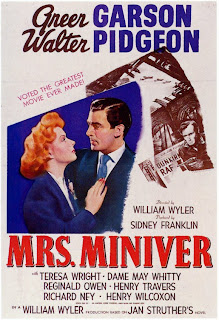by Chris Marshall:
We are now into the heart of World War II. Mrs. Miniver was the first Best Picture
winner produced after the United States became involved in the war, and it was
also the first winner to mention the war at all. Casablanca and The Best Years of Our Lives will also involve the war, but they are set before and after
American involvement.
Mrs. Miniver, on
the other hand, takes place right in the middle of wartime London. Miniver
herself is a housewife, her son is in the Air Force, and her husband was an
architect who volunteered his boat (and himself) to evacuate some troops from
Dunkirk. As you might expect, the son is called off to war and thus separated
from his girlfriend, who is the daughter of a rich person they know somehow or
another.
Is any of this sounding familiar? It’s very different in
form and tone, but the storyline of middle-class child (whose family still
somehow has its own maid and cook) falling in love with the child of rich
family is basically the same thing as You Can’t Take It With You. Yes, the genders are reversed, and neither actor
has the charm of Jimmy Stewart or Jean Arthur, but the similarities are still
striking, right down to the feelings of superiority displayed by the wealthy
parent(s).
There is one big difference, though. The middle class
characters in both films love their families, and both are somewhat embarrassed
by them at different times. However, while Jean Arthur’s character in You Can’t Take It With You was more or
less content with her station in life, the son in Mrs. Miniver has just returned from Oxford. And while he doesn’t
necessary have dreams of upward mobility, he’s obsessed with the idea of class conflict. He waxes
philosophical at dinner and argues with Carol, the girl who will become his fiancée.
His face and demeanor suggest a left-wing William F. Buckley, except without
the intellectual chops.
He never actually disavows these beliefs, but they fade into
the background as he falls more and more in love with Carol. The war has
arrived, however, and he is called into service. After the father volunteers to
go to Dunkirk, the womenfolk are left to fend for themselves.
 |
| A young William F. Buckley with his family |
You’ll notice I haven’t really said much about Mrs. Miniver
herself. She’s the pivot point, the character around whom everybody else
revolves. But the movie isn’t really about her; it’s mostly about the son and
his fiancée. She does have one key scene, though. A German pilot crash lands
near her house and forces her, at gunpoint, to take him to her house and give
him food and milk. He is gravely wounded, however, and he collapses, allowing
her to call the police. I think the scene is meant to portray Mrs. Miniver as a
saintly being, willing to care for even the people who are trying to kill her
son.
Unfortunately, it comes across as relatively pointless, as
it never again is brought up, except when her husband drags the truth out of
her about what happened. But even then, it just sort of fizzles out.
The film comes to a head when (SPOILER) German planes begin bombing the city. British fighters
scramble to fight them off, and Mrs. Miniver and Carol are on their way home
from a flower show. I admire their efforts to avoid clichés, but what follows
seems a little farfetched. The son is
based at a local air strip, and when they see a plane crash right by their car,
they assume the worst.
Since it’s an Oscar winning drama, I assume they’ll find
their dead son/fiancé, who will then say something inspirational with his dying
breath. But no! It’s not him at all, and in the meantime, Carol is shot dead by
an enemy fighter plane! At least I didn’t see it coming.
The son returns home, and they all mourn their loss. The
rich mother and Mrs. Miniver have become the best of friends, and they realize
how petty their differences were all along.
This was basically the Cavalcade
of the 1940s. It’s not necessarily a bad movie, but I don’t think I’ll
remember a single thing about it in a couple of weeks. It was a very “safe”
pick for Best Picture, but was it actually the best? I find that hard to
believe. Tomorrow, on the other hand, we get Casablanca, a film that is great by any possible criterion. It
makes me so happy when the Academy gets it right.

No comments:
Post a Comment